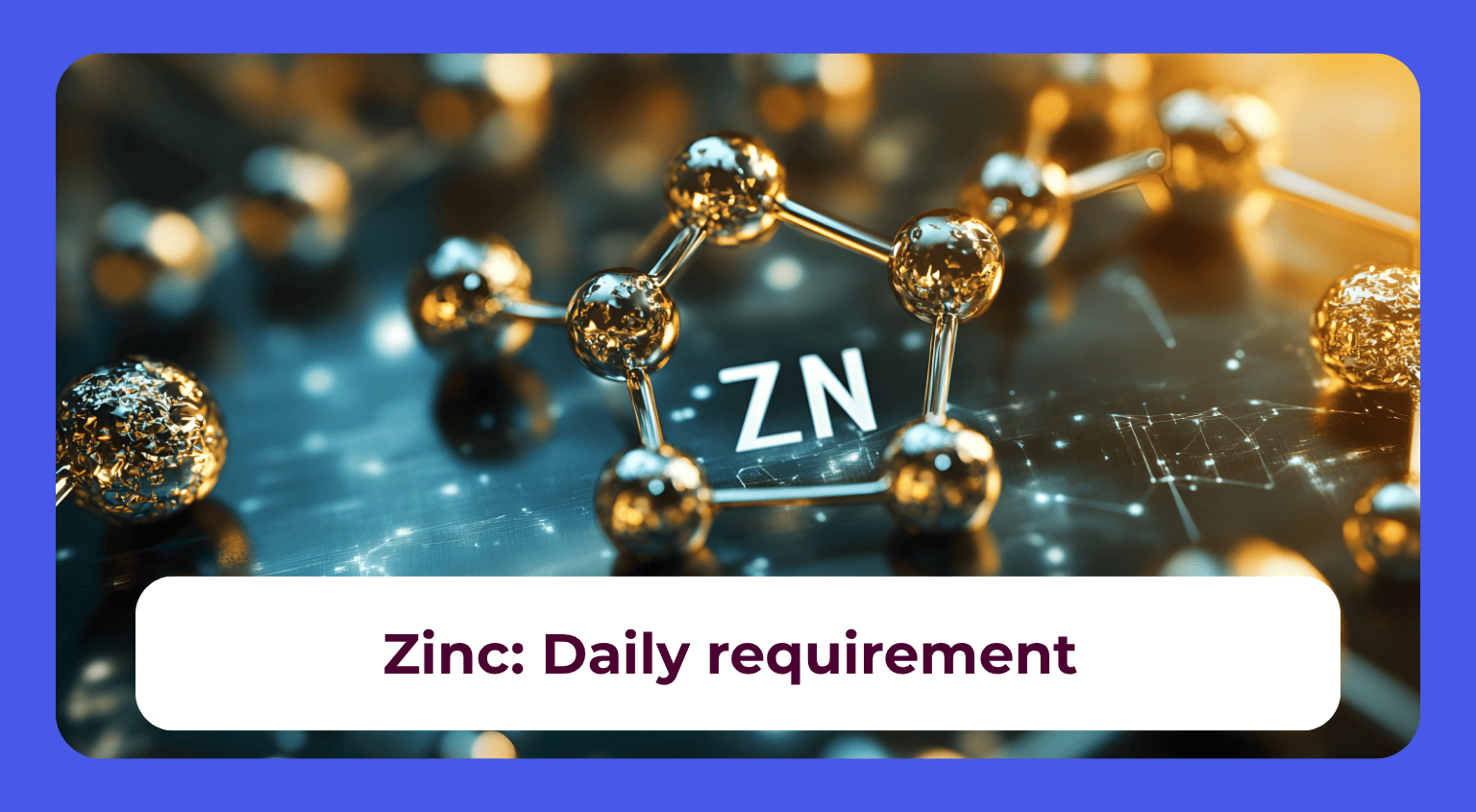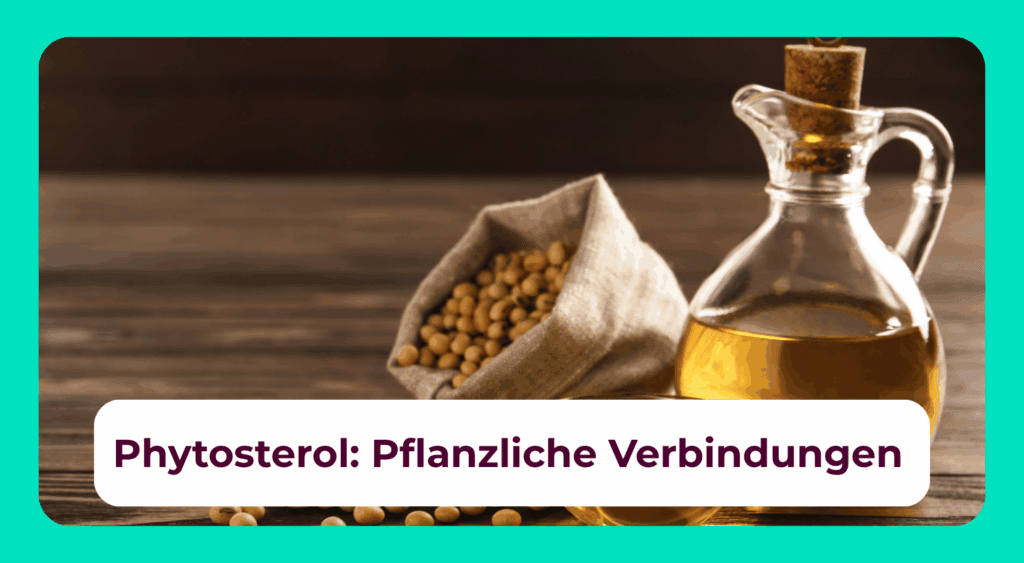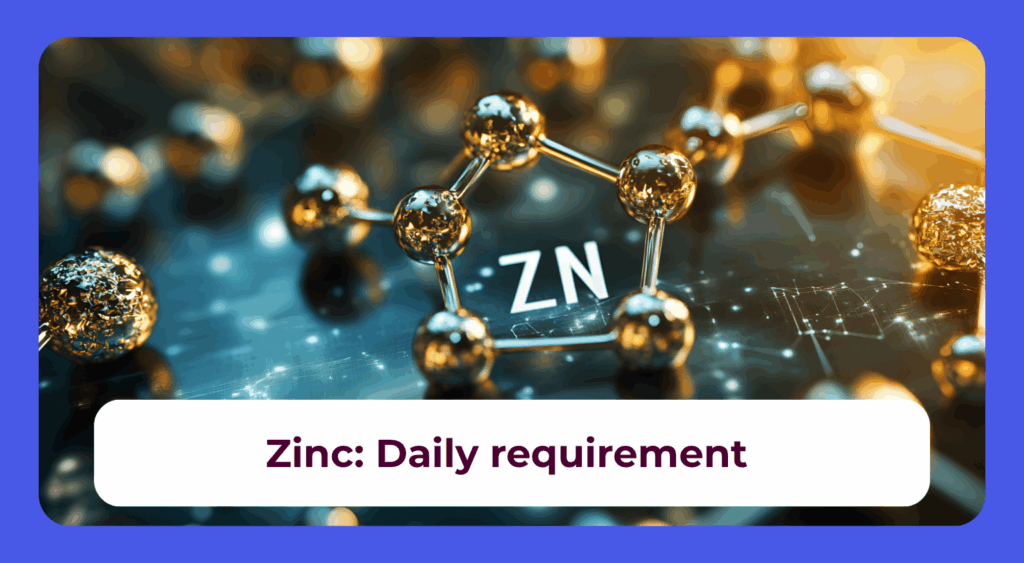Zinc at a glance
- Zinc is a vital trace element that is important for the maintenance of the skin, nails and hair, among other things.
- Adults need between 7 and 16 mg of zinc per day, depending on gender and phytate intake.
- Foods with a high zinc content are, for example, beef, oatmeal, and cheese.
- A zinc deficiency is mainly triggered by diseases and can manifest itself, for example, with hair loss and skin inflammation.
- Since an excess can cause side effects, zinc supplements should not be dosed too high.
Zinc is an essential nutrient that is involved in numerous metabolic processes in the body. Zinc contributes to the maintenance of healthy skin, hair and nails, among other tissues. Regular intake through diet is essential for good health. In certain situations, an additional zinc supplement can be useful to counteract a deficiency.
What is zinc?
Zinc is one of the trace elements. It is found in the hair, skin, liver, eyes and bones, among other things. The body can neither produce zinc itself nor store it in significant quantities. For this reason, the trace element must be supplied regularly in sufficient quantities with food.
What is the function of zinc in the body?
Zinc is an important component of many enzymes. As a result, the trace element is involved in numerous processes in the human organism. For example, zinc helps protect cells from oxidative stress. It also plays a key role in maintaining healthy skin, nails, and hair.
Furthermore, zinc also contributes to, for example:
- a normal function of the immune system,
- a normal metabolism of macronutrients,
- a normal metabolism of vitamin A,
- normal DNA synthesis and
- normal cognitive function.
Does zinc help with colds?
Zinc is often taken to help prevent or relieve cold symptoms, especially in combination with vitamin C. Despite its importance for the immune system, the effect of zinc on colds has not been definitively proven.
A meta-analysis published in 2024 concluded that zinc is unlikely to have a significant impact on the risk of catching a cold. The duration of the cold may be slightly reduced with a sufficiently high dose. However, the risk of side effects also increases.1
What is the daily requirement?
The zinc requirement is influenced by several factors. As with most other micronutrients, these include gender and age. In addition, the DGE (German Nutrition Society) also takes phytate intake into account in its reference values for adults.
The following amounts are recommended for zinc intake:
- According to the DGE, infants have a daily requirement of 1.5 to 2.5 milligrams.
- Children between the ages of 1 and 10 need 3 to 6 milligrams per day.
- Female children and adolescents between the ages of 10 and 19 have a daily zinc requirement of 8 to 11 milligrams.
- Male children and adolescents between the ages of 10 and 19 have a slightly higher requirement of 9 to 14 milligrams.
- Adult women need 7 milligrams per day for low phytate intake, 8 milligrams for medium and 10 milligrams for high phytate intake.
- Adult men need 11 milligrams per day for low phytate intake, 14 milligrams for medium and 16 milligrams for high phytate intake.
- During pregnancy and breastfeeding, women’s zinc requirements are increased and may rise to 11 mg (with low phytate intake) or 14 mg (with high phytate intake) per day.2
Why does phytate affect zinc requirements?
Phytate is the salt form of phytic acid. It is found in many plant foods and can bind minerals such as calcium, magnesium and zinc, reducing their absorption in the intestine. This property also allows it to bind zinc from food in the stomach and intestines. As a result, the body cannot absorb the trace element. A high phytate intake can reduce zinc absorption by up to 45% compared to a low phytate intake.3
How can the phytate intake be estimated?
The intake depends on dietary habits.
- Phytate is mainly found in whole grains and legumes. However, the phytate content can be reduced by certain preparation methods such as fermentation, germination, or soaking.
- The phytate intake is considered high if the diet consists mainly of legumes, unfermented whole grain products and contains little animal protein.
- Those who eat a wholesome diet and regularly consume meat and fish in addition to phytate-containing foods can assume a medium intake.
- The main consumption of animal protein sources in combination with a large avoidance of legumes and whole grain products ensures a low phytate intake.4
How is the body supplied with zinc?
Like other minerals and trace elements, the body cannot produce zinc itself. In order to ensure a needs-based supply, it must therefore be consumed regularly through food.
Which food is high in zinc?
Zinc is found in numerous foods. Good sources are mainly meat, fish, and dairy products. Certain plant foods such as whole grains, nuts, and legumes also contain zinc, although the bioavailability of zinc from these sources may be reduced due to phytate.

Examples of foods containing zinc (mg per 100 g)
- Beef 4.41
- Brazil nuts 4
- Brown rice 1.52
- Carp 0.9
- Corn 2.5
- Eggs 1.35
- Emmental 4.63
- Gouda 3.9
- Lamb 2.3
- Oatmeal 4.06
- Pork liver 6.35
- Prawns 2.17
- Soybeans 4.18
- Walnuts 2.7
- White beans 2.64
How does a zinc deficiency occur?
Normally, a balanced diet is sufficient to absorb enough zinc. At least in industrialized countries such as Germany or Austria, a diet-related deficiency rarely occurs. However, certain population groups such as the elderly, vegetarians, and vegans may be at increased risk.
However, various diseases can promote the development of a deficiency by interfering with zinc absorption in the intestine. This is the case, for example, with Crohn’s disease. Some people also suffer from a genetic zinc absorption disorder, which prevents them from properly absorbing the trace element.
How does a zinc deficiency manifest itself?
The body needs zinc for numerous functions. Accordingly, a deficiency can manifest itself through a variety of non-specific symptoms.
Possible symptoms of zinc deficiency include:
- Problems with wound healing,
- increased susceptibility to infections,
- Skin inflammation and
- Hair loss.
How can zinc deficiency be diagnosed?
The symptoms of zinc deficiency may also indicate other health problems. Since zinc is only present in small amounts in the blood and zinc levels can fluctuate greatly, it is difficult to accurately diagnose zinc deficiency based on blood values. Therefore, a zinc deficiency is usually assumed if the symptoms improve after zinc supplementation.
How can a zinc deficiency be treated?
In many cases, a slight zinc deficiency can be remedied by consuming more zinc-containing foods such as oatmeal, beef, and nuts. In the case of pronounced deficiency symptoms, the additional intake of a zinc supplement may be necessary. An individualized dosage is important in this case to avoid excessive intake.
Want to Explore the Future of Nutrition?
Discover how genetic testing can provide in-depth insights into vitamin and mineral needs. Partnering with Novogenia opens the door to offering advanced, personalised health recommendations based on genetics. As an expert in nutrigenetics, Novogenia equips businesses with the tools to elevate their health services.
By becoming a Novogenia partner, you’ll gain access to cutting-edge genetic analyses, enabling you to offer your customers highly customised health solutions. With Novogenia’s support, businesses can stand out in the growing field of personalised nutrition, building customer loyalty and expanding service offerings. Take the next step in transforming health services and unlocking the full potential of nutrigenetics.
Is too much zinc harmful?
An excess of zinc can be just as harmful as a deficiency. If the intake is limited to the diet, there is no risk in this regard. If, on the other hand, you take too much zinc as a dietary supplement, excessive zinc supplementation can lead to various side effects.
An overdose can cause the following symptoms, for example:
- Anorexia
- Stomach cramps
- Nausea
- Diarrhea
- Headache
Copper shortage due to zinc surplus
In addition to the symptoms mentioned, an overdose of zinc can also promote a copper deficiency. This is because zinc inhibits the absorption of copper in the intestine. The consequences of a copper deficiency include anemia, weakened connective tissue and skin pigmentation disorders.
How much zinc can you take a day?
In order to avoid an excess and the associated side effects, it is essential to follow the recommendations for the maximum daily dose when using zinc supplements.
- The European Food Safety Authority (EFSA) states that an intake of up to 25 milligrams of zinc per day is considered safe for adults in the long term.5
- The German Federal Institute for Risk Assessment (BfR) recommends a maximum daily dose of 6.5 milligrams for zinc preparations – in addition to the dietary intake. In the case of foodstuffs, the BfR generally advises against fortification with zinc.6
Is 25 mg of zinc a day too much?
The EFSA states the tolerable total intake of zinc for adults at 25 milligrams per day. This amount includes both zinc intake through diet and supplements. A daily intake of 25 milligrams, as recommended by some zinc supplements, may be too high when combined with normal dietary intake and could cause side effects such as nausea, vomiting, or copper deficiency over time.
When are zinc supplements useful?
Healthy people can usually cover their daily requirement well with their diet. Therefore, additional intake as a dietary supplement is often unnecessary and not associated with any added benefits. In some situations, however, a zinc supplement can be useful to meet an increased need or to compensate for an existing zinc deficiency. Whether this is necessary should be decided on an individual basis, depending on zinc requirements and, if needed, in consultation with a medical professional.
Should you take zinc in the evening?
It usually doesn’t matter whether you take zinc supplements in the morning or in the evening. This has no effect on how the trace element works. However, it may be better tolerated if taken with food.
Important to know
If you are not a healthcare professional and experience symptoms, have existing health conditions, or suspect a deficiency, consult a physician.
- 1 Nault D, Machingo TA, Shipper AG, Antiporta DA, Hamel C, Nourouzpour S, Konstantinidis M, Phillips E, Lipski EA, Wieland LS: Zink zur Vorbeugung und Behandlung von Erkältungskrankheiten (Veröffentlichung: 09.05.2024). URL: https://www.cochrane.org/de/CD014914/ARI_zink-zur-vorbeugung-und-behandlung-von-erkaltungskrankheiten (zuletzt aufgerufen am: 21.10.2024).
- 2 Deutsche Gesellschaft für Ernährung e.V.: Empfohlene Zinkzufuhr (Stand: 2019). URL: https://www.dge.de/wissenschaft/referenzwerte/zink/ (zuletzt aufgerufen am: 21.10.2024).
- 3 Deutsche Gesellschaft für Ernährung e.V.: Ausgewählte Fragen und Antworten zu Zink (Stand: 2019). URL: https://www.dge.de/gesunde-ernaehrung/faq/ausgewaehlte-fragen-und-antworten-zu-zink/ (zuletzt aufgerufen am: 21.10.2024).
- 4 Deutsche Gesellschaft für Ernährung e.V.: Ausgewählte Fragen und Antworten zu Zink (Stand: 2019). URL: https://www.dge.de/gesunde-ernaehrung/faq/ausgewaehlte-fragen-und-antworten-zu-zink/ (zuletzt aufgerufen am: 21.10.2024).
- 5 European Food Safety Authority: Overview on Tolerable Upper Intake Levels as derived by the Scientific Committee on Food (SCF) and the EFSA Panel on Dietetic Products, Nutrition and Allergies (NDA) (Stand: Juni 2024). URL: https://www.efsa.europa.eu/sites/default/files/2024-05/ul-summary-report.pdf (zuletzt aufgerufen am: 21.10.2024).
- 6 Bundesinstitut für Risikobewertung: Höchstmengenvorschläge für Zink in Lebensmitteln inklusive Nahrungsergänzungsmitteln (Veröffentlichung: 2021). URL: https://www.bfr.bund.de/cm/343/hoechstmengenvorschlaege-fuer-zink-in-lebensmitteln-inklusive-nahrungsergaenzungsmitteln.pdf (zuletzt aufgerufen am: 21.10.2024).




